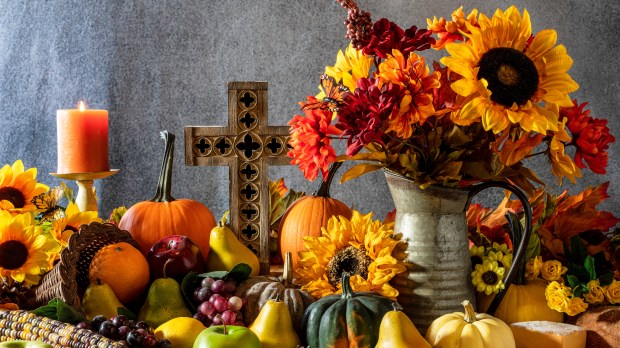At Plymouth, Massachusetts, exactly 400 years ago, settlers in the New World sat down for dinner and games with 90 native Americans and gave thanks to God.
But there has been so little coverage of this major anniversary that I wouldn’t have remembered it if my Facebook friend Peter Wolfgang hadn’t mentioned it.
We hesitate to celebrate that day for a good reason: The Wampanoag Indians, who participated, were treated deplorably for centuries after that 1621 dinner. But there are also very good reasons to keep telling the story of the first Thanksgiving.
For 400 years, the story of Thanksgiving has taught Americans to value unity.
Far from being a myth, this brief clip from the PBS’s 2015 documentary on the first colonial settlers tells “The True Story of the First Thanksgiving.”
It reports how, according to the journal kept at the time by Edward Winslow, despite terrible losses, English settlers enjoyed a good harvest, thanks to Tisquantum, often called Squanto. So they set aside time “to rejoice together after we had gathered the fruit of our labors.”
A Wampanoag Indian historian on the program confirms much of what we know of the story of Thanksgiving. “The English were doing this thing and Massasoit showed up” with 90 men, Lisa Coombs says. “They stayed for three days, they went out and got five deer to add to what the English were cooking. They played games together.”
“We love the story of Thanksgiving,” author Kathleen Donegan adds, “because it’s about alliance and abundance and envisioning a future where native Americans and colonial Americans can come together and celebrate the providences of a single God.”
That story would call Americans to unity again and again. In midst of the Civil War, Abraham Lincoln appealed to the story to “heal the wounds of the nation and to restore it as soon as may be consistent with the Divine purposes to the full enjoyment of peace, harmony, tranquility, and Union.”
For 400 years, the Thanksgiving story has taught Americans about God.
That name “Thanksgiving” has become especially important as America has grown more secular.
For millennia, human beings have felt the need to be grateful for all they receive. The oldest holidays in recorded human history were Thanksgiving festivals. The ancient Greeks celebrated the festival of Demeter, a goddess of agriculture, and the Jewish people celebrated the feast of Tabernacles and the Passover.
Every people who settled in the New World had a tradition of thanksgiving, from the 11th-century Vikings to the 16th-century Spaniards who celebrated the Eucharist, which means “Thanksgiving,” in Florida.
To this day, Thanksgiving is practically a proof for the existence of God. We intuitively realize that we need to thank Someone for all we have received.
For 400 years, Thanksgiving has mourned the dead.
From the very first, Thanksgiving has also had a bittersweet edge.
“Part of the reason that they were grateful,” Donegan says in PBS’s documentary, is that “they had been in such misery. They had lost so many people on both sides.” Their meal celebrated “abundance that is a relief from loss. But we don’t think about the loss, we think about the abundance.”
We are grateful each Thanksgiving because we know the year could have been far worse, and at our Thanksgiving table we not only see everyone who is there — we notice everyone who is missing.
This was especially true 20 years ago, in 2001. “As we recover from the terrible tragedies of September 11,” President George W. Bush proclaimed, “let us give thanks for the millions of people of faith who have opened their hearts to those in need with love and prayer, bringing us a deeper unity and stronger resolve.”
For 400 years, Thanksgiving has told us who we are.
“Man is a storytelling animal,” said philosopher Alasdair MacIntyre. “I can only answer the question ‘What am I to do?’ if I can answer the prior question ‘Of what story or stories do I find myself a part?’”
In 1962 America’s first Catholic president, John F. Kennedy, said “Let us renew the spirit of the Pilgrims at the first Thanksgiving, lonely in an inscrutable wilderness, facing the dark unknown with a faith borne of their dedication to God and a fortitude drawn from their sense that all men were brothers.”
It’s true that the Thanksgiving story can cover over the worst of who we are. But it is worth telling, because it also reminds us of the best that we can be.
Click here for more thoughts on Thanksgiving in Tom Hoopes’ podcast, Catholic Living.


